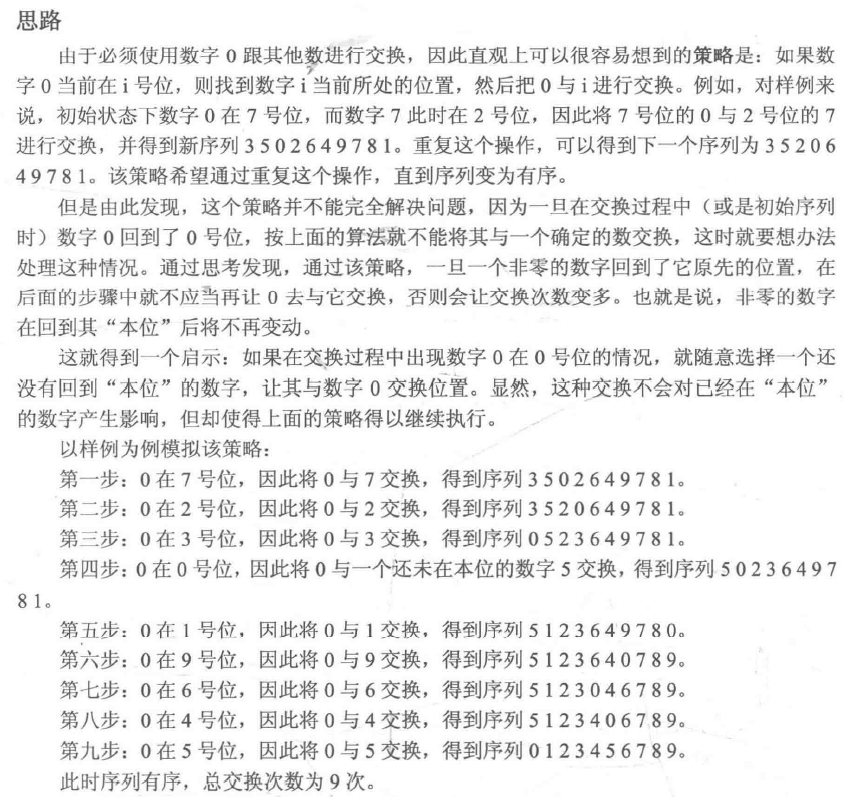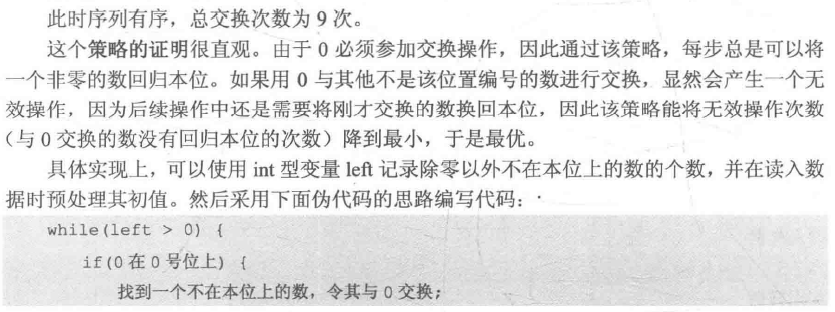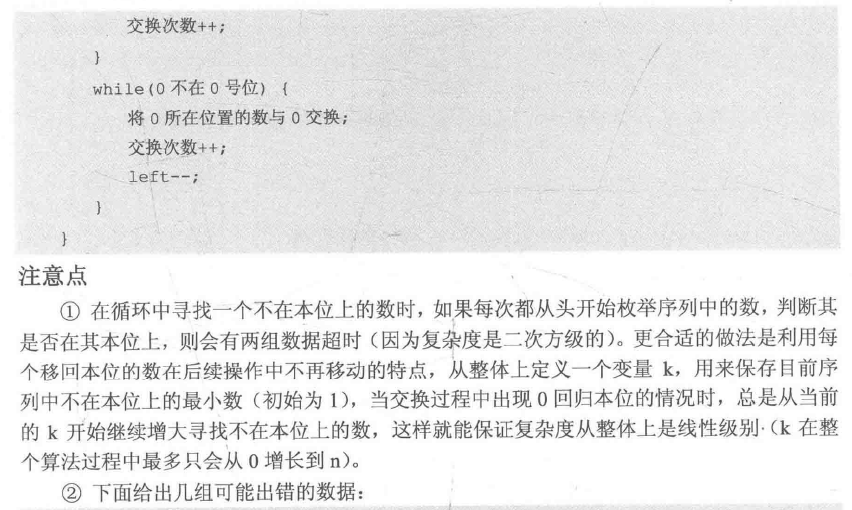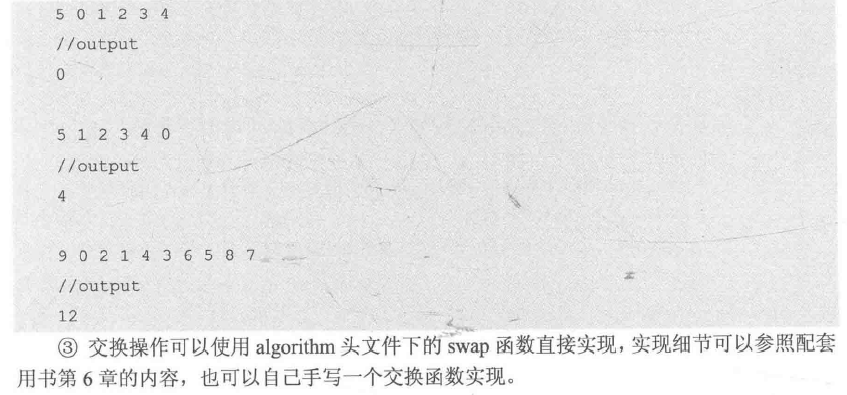Given any permutation of the numbers {0, 1, 2,..., N-1}, it is easy to sort them in increasing order. But what if Swap(0, *) is the ONLY operation that is allowed to use? For example, to sort {4, 0, 2, 1, 3} we may apply the swap operations in the following way:
Swap(0, 1) => {4, 1, 2, 0, 3}
Swap(0, 3) => {4, 1, 2, 3, 0}
Swap(0, 4) => {0, 1, 2, 3, 4}
Now you are asked to find the minimum number of swaps need to sort the given permutation of the first N nonnegative integers.
Input Specification:
Each input file contains one test case, which gives a positive N (<=105) followed by a permutation sequence of {0, 1, ..., N-1}. All the numbers in a line are separated by a space.
Output Specification:
For each case, simply print in a line the minimum number of swaps need to sort the given permutation.
Sample Input:
10 3 5 7 2 6 4 9 0 8 1
Sample Output:
9
题目大意:
给出一个n个数的序列,数字为0~n-1的乱序,每次用两两交换的方式而且只能用0和另一个数交换,使序列变成有序的,问最少需要多少步骤。
分析:
1.0号为哨兵, 用哨兵与其他数字交换,使其他数字回到有序的位置(最后有序时所处的位置),则排序完成
2.a[t] = i; 表示t数字当前正在占着哪一个位置。 (如果想实时监测每个数字的位置,可以用 b 数组{b[a[i]] = i } 缓存一下数据,输出查看的)
3.依次遍历每个位置i,如果当前位置不是与之对应的数字,那么我们让这哨兵来去该数执行操作回到正确位置
4.数字如何被哨兵执行操作回到序的位置:
如果哨兵此时不在自己有序的位置上,那就,先让哨兵去让他占的那个位置上的真正应该放的数字回到此位置,即交换哨兵和此数字,我们swap(a[0],a[a0]),直到哨兵在交换的过程中回到了自己的有序位置。字词再次检查该位置是不是应该放的数字(别的数字回到有序位置的时候即哨兵执行操作的过程中,有可能让此位置该有的数字回到位置)。如果此位置不是当前数字,那哨兵和他交换swap(a[0],a[i]),就是让他先去哨兵的有序位置待一会,等下一轮操作,哨兵会把他交换回来的。如果此位置已经是该数字了,那就什么都不做。
5.当到达最后一个位置时候,两种情况 1)。如果第一个数字和最后一个数字都在自己的有序位置 那ok~ 2).哨兵和最后一个数字互相占着对方的位置,那最后一个数字就是哨兵,交换一次后,哨兵在交换后的位置等待,就是已经回到自己的有序位置,此时排序也是完成的。此过程包括在4里面了,怕你们不理解,单独说一下~
原文链接:https://blog.csdn.net/liuchuo/article/details/52264805
柳神代码
#include <iostream>
using namespace std;
int main() {
int n, t, cnt = 0, a[100010];
cin >> n;
for(int i = 0; i < n; i++){
cin >> t;
a[t] = i;
}
for(int i = 1; i < n; i++) {
if(i != a[i]) {
while(a[0] != 0) {
swap(a[0],a[a[0]]);
cnt++;
}
if(i != a[i]) {
swap(a[0],a[i]);
cnt++;
}
}
}
cout << cnt;
return 0;
}
题解
菜鸡的我并没有看懂柳神的分析,下为算法笔记的解释,比较易懂一些~




#include <bits/stdc++.h>
using namespace std;
const int maxn=100010;
int pos[maxn]; //存放各数字当前所处的位置编号
int main()
{
#ifdef ONLINE_JUDGE
#else
freopen("1.txt", "r", stdin);
#endif
int n,ans=0; //ans表示总交换次数
scanf("%d",&n);
int left=n-1,num; //left存放除0以外不在本位上的数的个数
for(int i=0;i<n;i++){
scanf("%d",&num);
pos[num]=i; //num所处的位置为i
if(num==i&&num!=0){ //如果除0以外有在本位上的数
left--; //令left减一
}
}
int k=1; //k存放除0以外当前不在本位上的最小的数
while(left>0){ //只要还有数不在本位上
//如果0在本位上,则寻找一个当前不在本位上的数与0交换
if(pos[0]==0){
while(k<n){
if(pos[k]!=k){ //找到一个当前不在本位上的数k
swap(pos[0],pos[k]); //将k与0交换位置
ans++; //交换位置加1
break; //退出循环
}
k++; //判断k+1是否在本位
}
}
//只要0不在本位,就将0所在位置的数的当前所处位置与0的位置进行交换
while(pos[0]!=0){
swap(pos[pos[0]],pos[0]); //将0与pos[0]交换
ans++; //交换次数加1
left--; //不在本位上的数的个数减1
}
}
printf("%d\n",ans);
return 0;
}